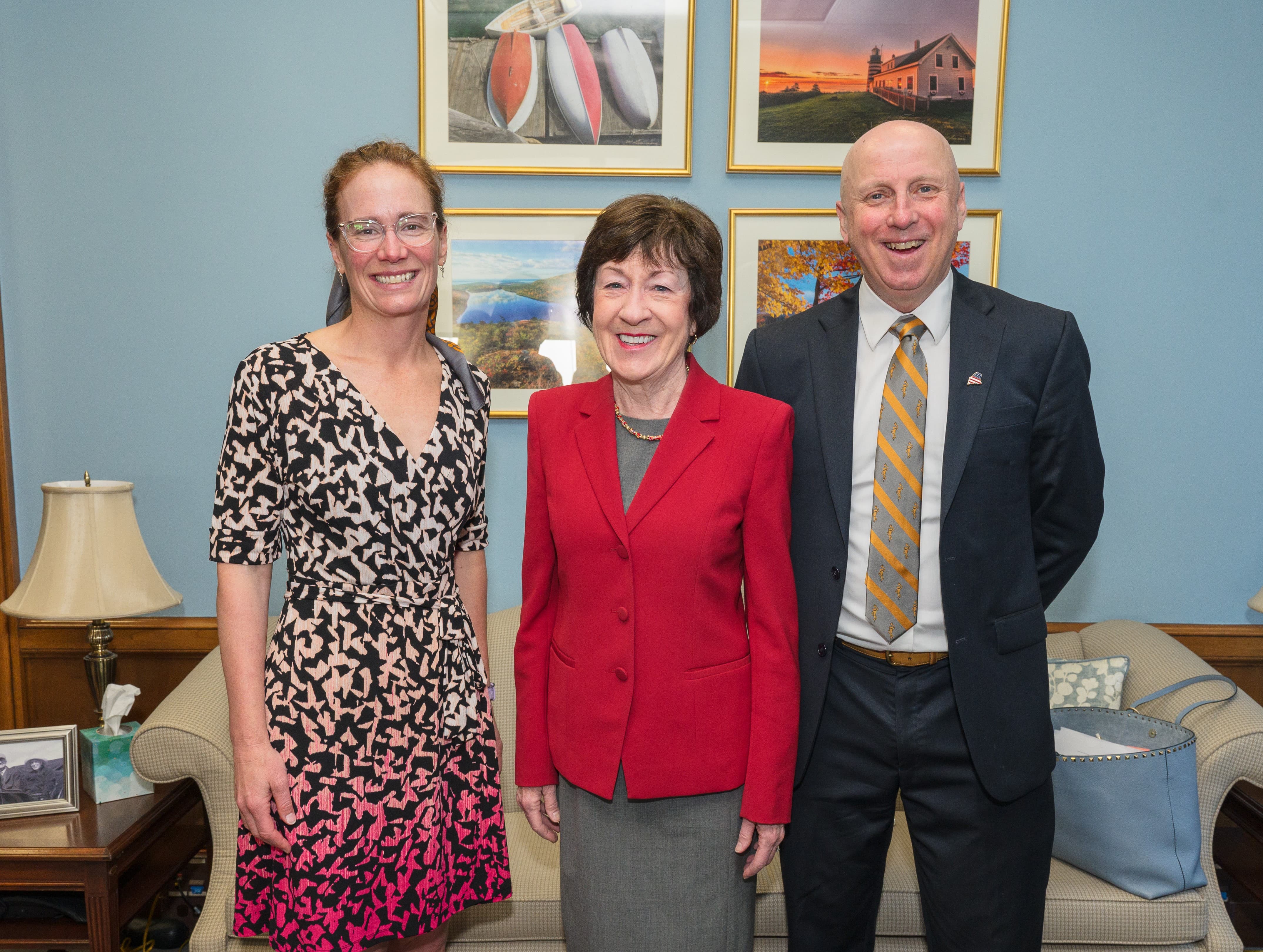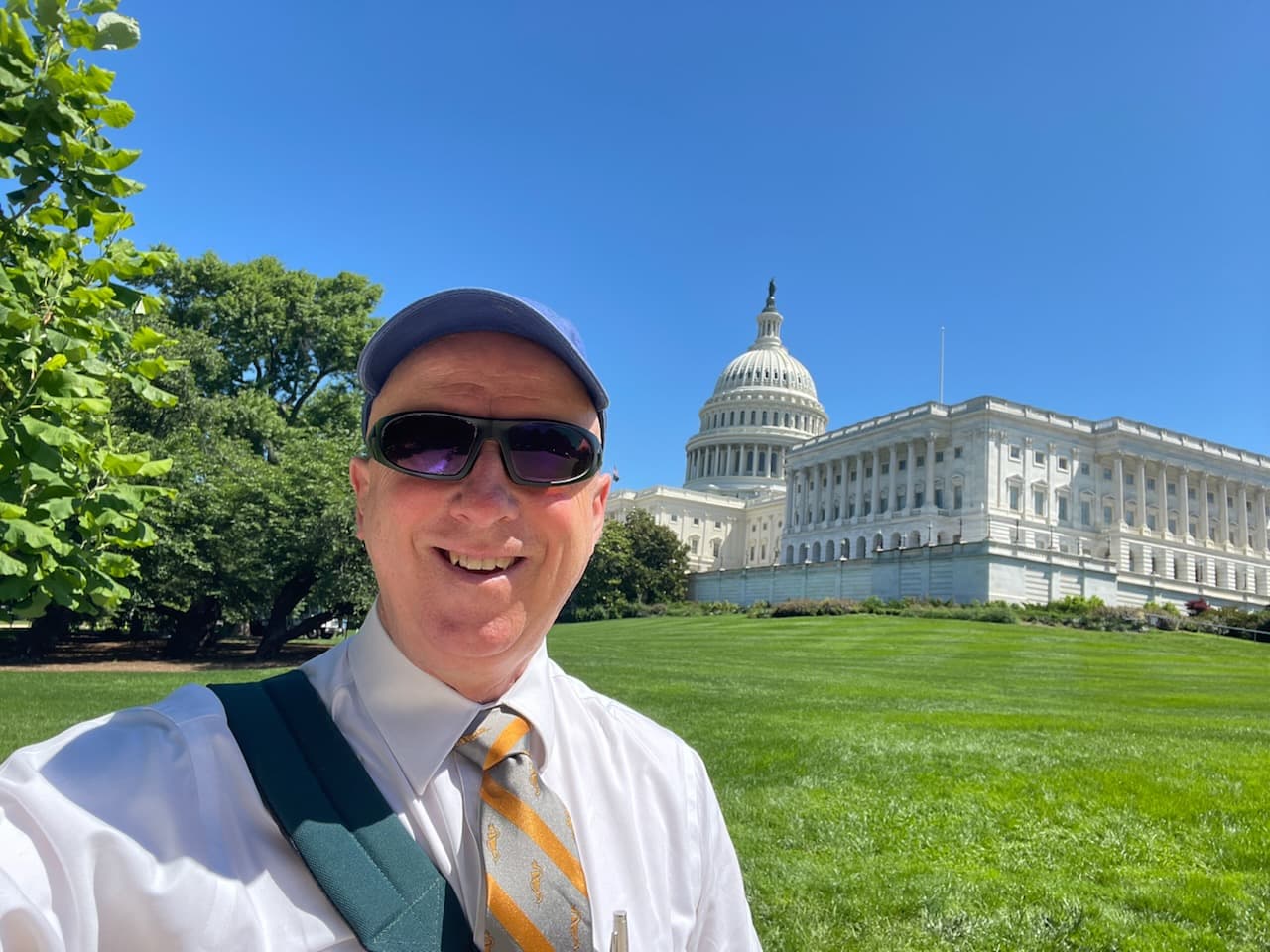Here in Maine the "shorter" Legislative Session was quite full!
Pat Connolly reported on the 2024 Maine Legislative Session:
It was a short but busy session in Augusta this year. It began with a huge push for gun safety measures in the aftermath of the Lewiston Massacre. On the first day of the Legislature the State House was packed with people, myself included, brandishing orange ribbons in support of common-sense gun safety measures. We proposed four pillars of gun safety, universal background checks, 72 hour waiting period for gun sales, a ban on semiautomatic weapons, and a red flag law to take weapons away from people who are at risk to themselves or others.
We were successful in the 72-hour waiting period, LD 2238 passed and passed into law without the Governor’s signature. LD 2224, expanding background checks, passed, and was signed by Governor Mills.
Unfortunately, the bump stock bill, LD 2086, passed both the House and Senate but was vetoed by the Governor. The red flag bill, LD 2283, was not taken up by the House or Senate. From a public health standpoint, the 72-hour waiting period was a big win, since the biggest risk from gun possession is from suicide. Providers of abortion and gender affirming care in Maine are effectively shielded from laws in other states by the passage of protection by the legislature. LD 227 was signed by Governor Mills.
Progress was made on reducing the burden of prior authorizations by the passage of LD 796. This bill proposes to improve the healthcare decision-making and treatment process for prescriptions and testing by reducing the pre-approval (prior authorization) burdens placed on healthcare providers by health insurance carriers. Lastly, great attention and effort was given to the banning of flavored tobacco products. Despite broad support from all aspects of health care, the flavored tobacco bill, LD 2416, was passed by the senate but never came up for a vote in the House. Opposition from a coalition of the tobacco lobby and the recovery community prevailed to kill the bill.
However, many towns, including Portland, South Portland, Falmouth, Brunswick, Bangor, Bar Harbor and Hallowell, passed ordinances banning flavored tobacco in their communities. Work continues preventing more children from becoming addicted to tobacco.
Get Involved!
All Advocacy is LOCAL! Please consider getting involved here in Maine - the Maine Medical Association & the Maine Osteopathic Association have a joint Legislative Committee that meets weekly during the session (usually January - May). Any MAFP member may join in on the zoom calls - contact the MMA to sign up and participate! (the calls are usually Thursday's at 6pm for 1 hour only)
For more information and to ask to be added to the Email notification list - please contact Sara Lepoff at the MMA: slepoff@mainemed.com
MMA's Advocacy page: https://www.mainemed.com/advocacy
Become a Doctor of the Day at the Legislature (during session) - this is a program coordinated by the Maine Medical Association - for more information and to register: https://www.mainemed.com/doctor-day-registration
MAFP Members Advocate for Family Medicine in Washington this May -
The MAFP was well represented by Drs. Pat Connolly & Cortney Linville who attended the AAFP Family Medicine Advocacy Summit in Washington May 19-21. Here's what Dr. Connolly had to say:
"I was pleased and privileged to attend the AAFP Family Medicine Advocacy Summit again last month and represent our state. The Maine delegation was comprised of Dr. Cortney Linville, who has an independent practice in Wiscasset, and myself (Dr. Pat Connolly - I practice in the Portland area).

We met the health legislative aides from the offices of Senator Susan Collins, Senator Angus King, and Representative Chellie Pingree. In addition, we were able to talk to Senator Collins in person as part of her weekly constituent coffee.
Topics on the AAFP agenda included:
Improving Access to Primary Care for High Deductible Health Plans Enrollees - high deductible plans discourage patients from accessing primary to deal with problems such as diabetes and hypertension and delay care, leading to worsening health outcomes. We support the Primary and Virtual Care Affordability Act (HR 7681), hitch would reauthorize payment for virtual visits as well allowing for two primary care visits per year which would be covered by health plans and not be subject to the high deductible.
Addressing Medical Student Debt – High student loan debt accumulates during residency training, a period during which new doctors earn barely enough to pay for ordinary living expenses (about $60,000 per year), let alone pay back their student loans. Interest currently accumulates during that time, adding to the crushing debt, and discouraging new grads from pursuing careers in lower paying specialties such as family medicine.
We advocated for the Resident Education Deferred Interest (REDI) Act (HR 1202 / S794). This bill would preclude the government from charging interest on their loans during when they are unable to afford payments on the principal. This bill is like what was done during the height of pandemic, when ALL student loans were put on deferment without accumulation of interest.
Medicare Coverage of Recommended Vaccines –  There is a split in coverage on vaccines in the Medicare program. All new immunizations are automatically covered by the Medicare Part D, the prescription drug coverage. Since most physicians cannot bill under part D, we are forced to refer to pharmacies for vaccines such as Tdap, Shingrix and RSV. Many patients cannot afford the upfront costs of these shots, and compliance with much needed care suffers.
There is a split in coverage on vaccines in the Medicare program. All new immunizations are automatically covered by the Medicare Part D, the prescription drug coverage. Since most physicians cannot bill under part D, we are forced to refer to pharmacies for vaccines such as Tdap, Shingrix and RSV. Many patients cannot afford the upfront costs of these shots, and compliance with much needed care suffers.
Therefore, we are strongly advocating for legislation that would require Part B coverage of all ACIP recommended vaccines so family physicians can easily administer them to Medicare patients in their offices, in a single visit."
Family Medicine Advocacy Rounds – Issue 25, June 2024 
Welcome to Family Medicine Advocacy Rounds—the American Academy of Family Physicians' monthly tip sheet to educate, engage, and update you on the latest policy issues affecting family physicians and their patients.
AAFP Applauds Reintroduction of Legislation to Streamline Prior Authorizations
Why it matters: Family physicians are overburdened by prior authorization requirements, which can often cause harmful care delays and inadvertently lead to negative patient outcomes. The AAFP advocates to reform prior authorization and remains focused on enabling physicians and patients to have access to clear guidelines for prior authorization requirements and timely responses from insurance plans.
What we’re working on:
- On June 12, congressional champions reintroduced the Improving Seniors’ Timely Access to Care Act (H.R. 8702/S. 4518), which would streamline and standardize prior authorization under the Medicare Advantage program and protect patients from unnecessary delays in care. We are urging Congress to swiftly pass this bipartisan legislation.
- While the Centers for Medicare and Medicaid Services recently finalized proposals to reform prior authorization, legislation is still necessary to ensure that these much-needed changes are made permanent. That’s why passage of the Seniors’ Act is imperative.
Family Physicians Relieved SCOTUS Preserves Patient-Physician Relationship
The June 13 U.S. Supreme Court decision in the case of Alliance for Hippocratic Medicine (AHM) v. Food and Drug Administration (FDA) preserves the patient-physician relationship and upholds access to mifepristone, an FDA-approved medication.
The AAFP has long made clear that patients must be able to depend on their physicians to help them in making critical decisions about their health. Physicians must be able to practice medicine that is informed by their years of medical education, training, and experience and the available evidence.
Read more in the AAFP’s statement.
AAFP Asks CDC and FDA to Ensure Continued, Timely Access to COVID-19 Vaccines
Why it matters: As we prepare for another COVID-19, flu, and RSV season, it’s important that family physicians are able to provide important immunizations to patients in a timely manner.
What we’re working on:
- The AAFP joined the COVID-19 Vaccine Education and Equity project and several other health organizations in sending a letter to the Centers for Disease Control and Prevention and the U.S. Food and Drug Administration to ensure that this year, the COVID-19 vaccine is available early in the season.
- At the same time, the country is not where it needs to be with uptake. Part of the reason is that primary care physicians are unable to easily administer all recommended vaccines to their patients. This is because not all Advisory Committee on Immunization Practices–
- AAFP President Steven P. Furr, M.D., FAAFP, wrote in MedPage Today that Congress must pass legislation to require Medicare Part B coverage of all recommended vaccines, allowing patients to access vaccines more readily from their usual source of care and improving our nation’s uptake of one of the most cost-effective public health measures.
AAFP Responds to IPPS Proposed Rules
Why it matters:
The Centers for Medicare and Medicaid Services (CMS) released the Fiscal Year 2025 Hospital Inpatient Prospective Payment Systems proposed rule. The AAFP applauds CMS for continuing to prioritize health equity in the 2024 IPPS proposed rule. As the largest funder of graduate medical education, Medicare plays a significant role in addressing physician maldistribution and disparate access to care across the nation. If finalized as proposed, this rule would take several important steps to direct GME funding to the areas of greatest need, helping mitigate health access disparities and more effectively addressing physician shortages.
What we’re working on:
- The AAFP and the Council of Academic Family Medicine sent a joint letter to CMS offering our support and recommendations for the Fiscal Year 2025 IPPS proposed rule, particularly regarding a forthcoming distribution of GME residency slots and a newly proposed mandatory model, the Transforming Episode Accountability Model.
- This rule proposes several important steps that would direct GME funding to the areas of greatest need, including a proposal to require hospitals that serve areas designated as health professional shortage areas to have at least 50% of residents’ training time occur at training locations within a primary care or mental health–only geographic HPSA in order to be able to apply for new GME slots.
- Additionally, our organizations appreciate CMS’ recognition of the importance of primary care continuity in its proposal to confirm the patient’s primary care physician status during a hospitalization or procedure in the TEAM Mandatory Model. The AAFP supports the role of family physicians in providing continuity of care to their patients in all settings, both directly and by coordinating care with other health care professionals
- When considering finalizing the TEAM Mandatory Model, the AAFP encourages CMS to consider the impacts of the national physician workforce shortage. Hospitals, depending on their location, might experience challenges when referring patients after discharge. We encourage CMS to implement safeguards within this model that would prevent physicians from being penalized for situations beyond their control.
AAFP Applauds OCR Guidance to Help Practices Impacted by Cyberattack
Why it matters: The AAFP is pleased that the U.S. Department of Health and Human Services has provided updated guidance to make clear that “covered entity” health care institutions affected by the Change cyberattack can contact Change and direct it to notify patients directly that their information was compromised by the breach.
The AAFP had previously asked for more guidance from HHS regarding Health Insurance Portability and Accountability Act–related reporting requirements in relation to the Change Healthcare attack. The announcement comes on the heels of a joint letter from the AAFP and more than 100 other health care organizations in requesting that HHS’ Office of Civil Rights clarify that Change Healthcare is responsible for notifying impacted patients of the breach and all related reporting requirements, alleviating practices’ legal concerns and allowing them to focus on continuing to recover from the attack.
What we’re working on:
The AAFP continues to urge Congress to closely examine how unchecked consolidation affects the overall health system from the perspective of patients and the physicians who care for them.
- The cyberattack on Change Healthcare has had far-reaching implications for family physicians and other providers of health care services, affecting their ability to receive payments and perform everyday business functions that are essential to the delivery of patient care. The AAFP recently shared recommendations with the House Energy and Commerce Subcommittee ahead of its April hearing “Examining Health Sector Cybersecurity in the Wake of the Change Healthcare Attack.”
What We’re Reading
- AAFP President-elect Jen Brull, M.D., FAAFP, spoke with LinkedIn News about policies to improve access to behavioral health care, including adequate reimbursement for integrated care and training more family physicians in areas where there are shortages by advocating for more investment in the Teaching Health Center Graduate Medical Education Program, which funds residency spots in underserved areas.
- AAFP Board Chair Tochi Iroku-Malize, M.D., M.P.H., FAAFP, spoke to CNN about how family physicians can help address the maternal health crisis, which is alarmingly high in the U.S.
- Yalda Jabbarpour, M.D., director of the AAFP’s Robert Graham Center, wrote an op-ed in Modern Healthcare about the need to invest in primary care to avert dire workforce shortages. She outlines solutions to help physicians, including expanding team-based care models, enacting payment reform, and innovative technologies that can address clinician burnout.
For the latest policy updates on family medicine, follow us at @aafp_advocacy.
